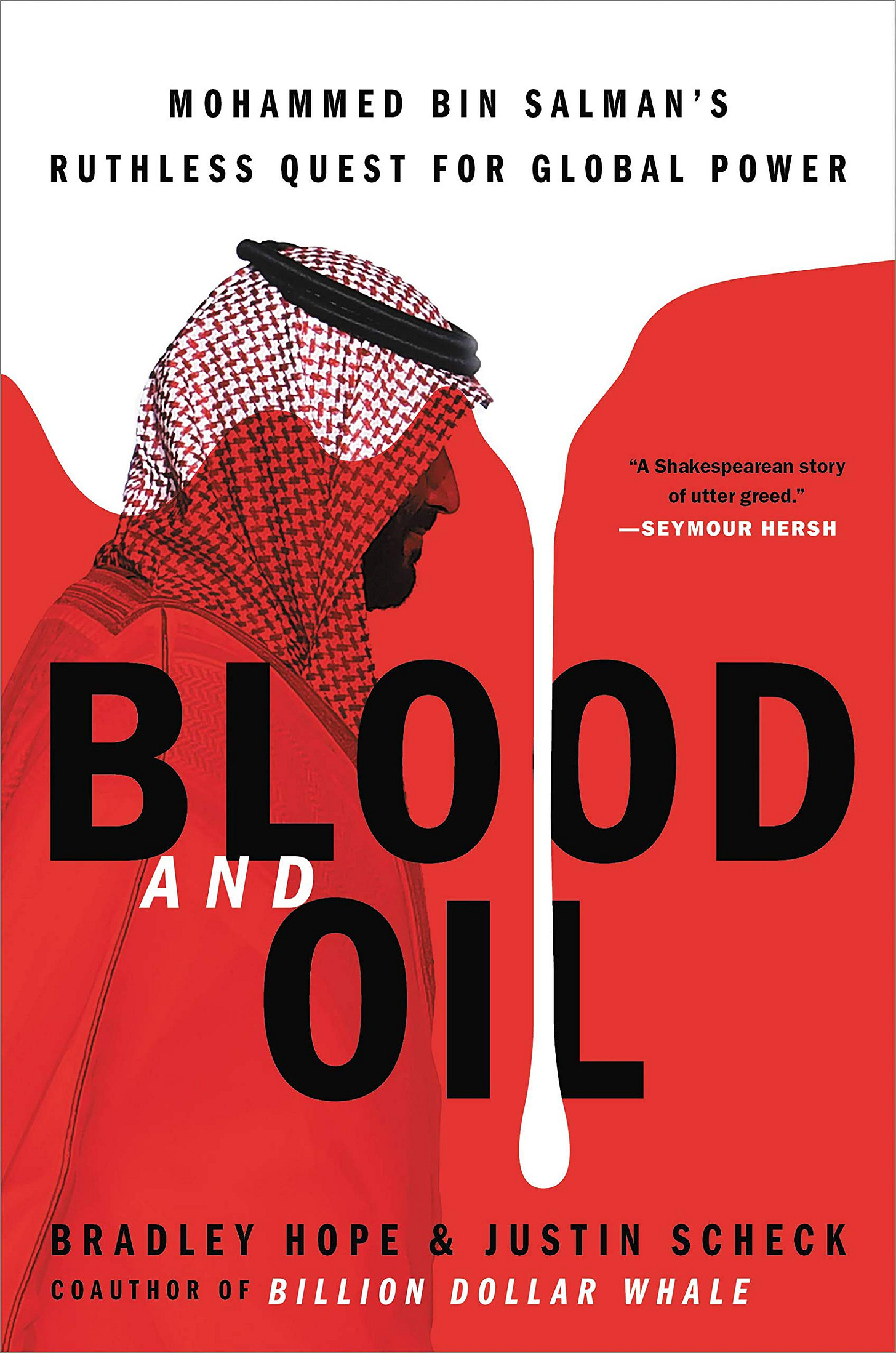Blood and Oil: Mohammed bin Salman's Ruthless Quest for Global Power
by Bradley Hope and Justin Scheck
Mohammed bin Salman, MBS, has become such a bête noire in the West that people have forgotten the uncomfortable fact that he remains genuinely popular among many of his own people. Part of this popularity can be attributed to a regime information control in Saudi Arabia, but a lot of his support is also genuine and even logical. Most Saudis are under the age of thirty, but they have been ruled by a hidebound genotocracy for decades that has embarrassed them while squandering much of their wealth. Unlike every other Saudi leader, MBS is also from this young generation. He shares many of the same frustrations as his young compatriots about the Saudi ruling class, and also holds similar views about the importance of technology and lifestyle liberalism. MBS arose from relatively anonymity inside the royal family and somehow smashed all the existing power structures to claim the crown prince role for himself. He’s done some good things with that power, including loosening social controls on women, reigning in the tyrannical religious police, and trying to attract foreign investment. He also famously rounded up a crowd of the richest, most corrupt Saudis and forced them to return their ill-gotten wealth at gunpoint while held captive in a hotel. How many ordinary people haven’t fantasized about a jubilee like that in their own country?
When he first emerged, I also had hopes for MBS. There was some reason to believe that as a young person he might elevate the voices of the many other young, talented, and progressive Saudis around the world who have long wanted to see a real change in their country. After a few years in power, however, it is clear that MBS is a much darker figure than most had anticipated. If I were to identify his root problem, it would be his staggering hubris which probably crosses the line into full megalomania. MBS truly believes that money can buy anything, including global affection, a modern economy, and even real-life science fiction cities. You probably don’t need to know at this point that he’s thin-skinned – his decision to murder a Washington Post columnist and Saudi gadfly has already made him famous on that score. Unconscionable schemes like NEOM and The Line, from which the global consulting industry has been happy to capitalize, have further revealed how vulnerable he is to any slick Westerner stroking his ego. MBS has some sort of positive idea of wanting his country to be modern, but he’s not interested in doing the humble, boring, intergenerational work of building institutions. Instead he has decided to try and buy shortcuts to modernity, allowing every vulture in the world to descend on the the financial patrimony of the Saudi people.
The world of oil is coming to an end this century, which is something that MBS does seem to understand. To survive, his country needs to transition from being run by a clan of scheming half-brothers gorging themselves on sales of a single finite energy resource into an impersonal, administrative state that entrusts the Saudi people themselves with developing their country. Saudi Arabia doesn’t have to be democratic to be stable or prosperous. But it does need independent governing, economic, and security institutions that even authoritarian-capitalist countries like Singapore and China possess. These institutions should have the continuity and independent culture necessary to maintain and refine their expertise regardless of who is in power. States with far less money, like Turkey and Iran, are able to punch above their weight in conflicts with the Saudis because they are run far more impersonally rather than being simply family property. MBS has certainly shaken up the al-Saud half-brothers system of governance by imprisoning and bullying his other family members. But he has not built an impersonal state: He’s simply replaced himself as the top dog in the family to whom all must answer. This is a recipe not for stable modern governance but for a regime that lasts only as long as one man, similar to what the Qaddafis and Assads of the world have built elsewhere in the Arab world.
In one passage of this book it’s mentioned that MBS has mused to others about potentially extending his lifespan for hundreds of years, using longevity technologies popular in Silicon Valley. I once had occasion to read thousands of hacked emails from Saif Qaddafi and noticed he was also interested in these therapies. While I doubt that MBS is going to be ruling his country in the year 2245, he is still a young man and is almost certainly going to be around in a few decades, barring a horrible coup by some Khomeini-like figure. As such, MBS may be one of the most consequential leaders in Saudi history. Like I said earlier too, like it or not, he’s also genuinely popular with a lot of his people, particularly the young. Leaders who stay in power a long time don’t tend to become more humble or self-critical, but we are going to have to hope that somehow MBS proves to be an exception. He’s not going anywhere, and, for the good of his own people, as well as the world, we can only hope that he learns something from his mistakes.

